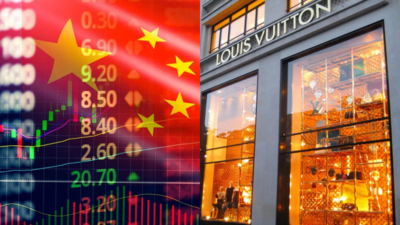[ad_1]

A hardnosed Chinese communist boss okays some policies, and an art-collecting French billionaire gets even richer. Weird? Not at all. Globally, the big money stuff often works like this.
The link is demand. And it worked like this:
- Xi signed off on a stimulus package for China, which, by its own record-breaking standards, is currently an economic laggard.
- China’s boss hopes the stimulus will, among other things, get Chinese consumers to spend more.
- Top end Chinese consumers have been especially spooked by serial blowups in the debt-ridden Chinese property sector. Real estate accounts for 70% of household wealth in China.
- Xi’s periodic targeting of Chinese super-rich hasn’t helped consumer confidence either. If your govt is targeting you for being wealthy, getting the next ‘it’ thing in luxury loses its allure.
- This was globally consequential because ever since its economic ‘miracle’, China has been a big spender on
luxury goods . It accounts for nearly a quarter of global luxury sales. - Most top-notch global luxury companies are European. Sluggish China sales had dampened their earnings and, therefore, stock prices.
- More so because American, European, South Korean and Japanese luxury consumers started reducing their spending from last year.
- Post-Xi’s stimulus, the hope was that Chinese will, sooner rather than later, spend more, including on luxuries.
- In anticipation, stock markets pushed up share prices of major European luxury companies.
- And that’s why the net worth of
Bernard Arnault , boss of French luxury companyLVMH (he and his family won 48% of the company) jumped. LVMH shares have risen 11% since Sept 24, when China made the stimulus announcement.
LVMH and more
Arnault isn’t the only luxury boss feeling richer. Top European luxury brands (the list includes British brand, Burberry) have all seen their stocks jump.
In descending order of the extent of stock price jump between September 24 and October 1, the list reads:
- Moncler (Italian. Brands include Moncler, Stone Island) – stock up by 13.8%.
- Brunello Cucinelli (Italian. Brand Brunello Cucinelli) – stock up by 12.9%.
- Compagnie Financière Richemont (Swiss. Brands include Cartier, Piaget, Van Cleef) – stock up by 12.7%.
- Burberry (British. Brand Burberry) – stock up by 12.6%.
- LVMH (French. Brands include Louis Vuitton, Moet Henessey, Givenchy, Dior, Bulgari, Fendi) – stock up by 11%.
- Kering (French. Brands include Yves Saint Laurent, Gucci, Balenciaga, Bottega Veneta, Alexander McQueen) – stock up by 10.9%.
- Hermes International (French. Brands include Hermes Paris, Crystal Saint-Louis, John Lobb) – stock up by 9.1%.
- EssilorLuxottica (French. Brands include Ray-Ban, Oakley, Dolce & Gabbana) – stock up by 3.6%.
Not just luxury stocks
Stocks of major auto companies, mining companies, and financial firms also jumped after the Chinese stimulus.It’s the same logic. If Chinese consumers start spending more, discretionary high-end products and services – diamonds to sleek cars to high-end investment advice – will see a jump in demand. Benchmark stock indices in the West rose for the same reason.
But bit of bad news for India
Sensex and Nifty, despite some dampeners now and then, have been on fire. Thanks to good macro numbers, healthy GDP growth and a growing domestic investor class. But also, thanks to somnolent Chinese stock markets, which led global investors to put more money in Indian stocks. Post-stimulus, Chinese stocks staged a recovery. Result? Indian markets were hit on Monday and were flat on Tuesday.
If Xi’s stimulus works as well as he hopes it would, a bull run in China’s stock markets may well get the Dalal Street bear out of hibernation. How bearish, will depend on how much FPIs switch from India to China and how much domestic investors can pump in.
The $18 trillion question
But will Xi’s stimulus really charge the nearly $18 trillion Chinese economy? As is frequently the case, economists don’t agree. Optimists argue that between making real estate financing easier and lowering mortgage and general lending rates, enough was done. Pessimists say Xi should have increased govt spending and okayed a bigger deficit to boost domestic demand.
We don’t know who’ll turn out to be right. But we do know Europe’s luxury bosses will be obsessing over this question.
The neologism ‘Xionism’ was created by Times of India.
[ad_2]
Source link


